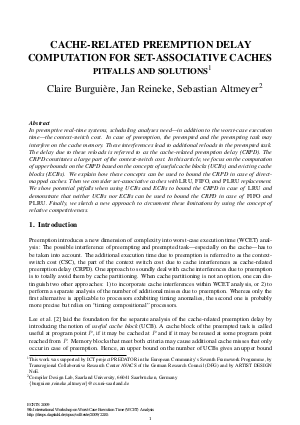Cache-Related Preemption Delay Computation for Set-Associative Caches - Pitfalls and Solutions
Authors Claire Burguière, Jan Reineke, Sebastian Altmeyer
-
Part of:
Volume:
9th International Workshop on Worst-Case Execution Time Analysis (WCET'09) (WCET 2009)
Part of: Series: Open Access Series in Informatics (OASIcs)
Part of: Conference: Workshop on Worst-Case Execution Time Analysis (WCET) - License:
 Creative Commons Attribution-NonCommercial-NoDerivs 3.0 Unported license
Creative Commons Attribution-NonCommercial-NoDerivs 3.0 Unported license
- Publication Date: 2009-11-26
File

PDF
OASIcs.WCET.2009.2285.pdf
- Filesize: 177 kB
- 11 pages
Document Identifiers
Subject Classification
Keywords
- WCET analysis
- caches
- set-associative
- preemption
- CRPD
Metrics
- Access Statistics
-
Total Accesses (updated on a weekly basis)
0Document
0Metadata
Abstract
In preemptive real-time systems, scheduling analyses need - in addition to the worst-case execution time - the context-switch cost. In case of preemption, the preempted and the preempting task may interfere on the cache memory. These interferences lead to additional reloads in the preempted task. The delay due to these reloads is referred to as the cache-related preemption delay (CRPD). The CRPD constitutes a large part of the context-switch cost. In this article, we focus on the computation of upper bounds on the CRPD based on the concepts of useful cache blocks (UCBs) and evicting cache blocks (ECBs). We explain how these concepts can be used to bound the CRPD in case of direct-mapped caches. Then we consider set-associative caches with LRU, FIFO, and PLRU replacement. We show potential pitfalls when using UCBs and ECBs to bound the CRPD in case of LRU and demonstrate that neither UCBs nor ECBs can be used to bound the CRPD in case of FIFO and PLRU. Finally, we sketch a new approach to circumvent these limitations by using the concept of relative competitiveness.
Cite As Get BibTex
Claire Burguière, Jan Reineke, and Sebastian Altmeyer. Cache-Related Preemption Delay Computation for Set-Associative Caches - Pitfalls and Solutions. In 9th International Workshop on Worst-Case Execution Time Analysis (WCET'09). Open Access Series in Informatics (OASIcs), Volume 10, pp. 1-11, Schloss Dagstuhl – Leibniz-Zentrum für Informatik (2009)
https://doi.org/10.4230/OASIcs.WCET.2009.2285
BibTex
@InProceedings{burguiere_et_al:OASIcs.WCET.2009.2285,
author = {Burgui\`{e}re, Claire and Reineke, Jan and Altmeyer, Sebastian},
title = {{Cache-Related Preemption Delay Computation for Set-Associative Caches - Pitfalls and Solutions}},
booktitle = {9th International Workshop on Worst-Case Execution Time Analysis (WCET'09)},
pages = {1--11},
series = {Open Access Series in Informatics (OASIcs)},
ISBN = {978-3-939897-14-9},
ISSN = {2190-6807},
year = {2009},
volume = {10},
editor = {Holsti, Niklas},
publisher = {Schloss Dagstuhl -- Leibniz-Zentrum f{\"u}r Informatik},
address = {Dagstuhl, Germany},
URL = {https://drops.dagstuhl.de/entities/document/10.4230/OASIcs.WCET.2009.2285},
URN = {urn:nbn:de:0030-drops-22856},
doi = {10.4230/OASIcs.WCET.2009.2285},
annote = {Keywords: WCET analysis, caches, set-associative, preemption, CRPD}
}
